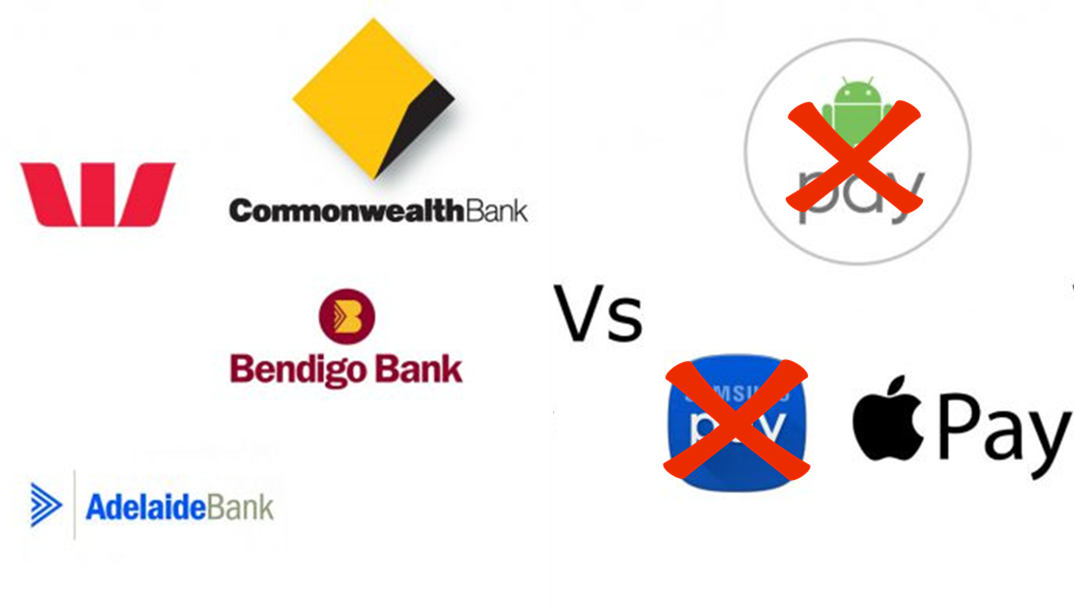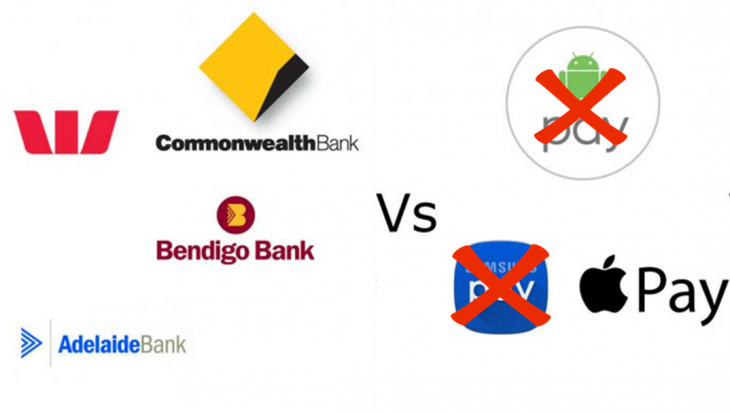For a few months now we’ve been following the skirmish between Australia’s banking industry and mobile wallet vendors, Apple, Google and Samsung. That battle has narrowed and now only Apple is in the Banks sights.
It would be easy to not consider this an ‘Android’ story anymore, however, I still very much think it is. We’ve kept an eye on the correspondence of submissions flowing into the ACCC and while it mainly amounts to a bunch of lawyers throwing sand at each other in the play pit, it does help shed some light on what the tone of mobile payments in Australia will be moving forward.
The core of the conglomerate of banks requests is the ability to access and utilise the NFC chip on Apple devices – something they can already do on Android – in order to develop in-house payment apps. Additionally, the Banks do not want to pay the ‘skim’ Apple charges on each transaction, which currently is taken from the banks share.
Apple
Apple is definitely drawing the expected line in the sand with the ACCC, their latest submission from 26 October makes it clear, that even if a collaborative boycott is granted they will not negotiate on any of the terms.
Apple has actually used their unwillingness to negotiate as evidence that the banks will not be able to achieve the required ‘public benefit’ that is needed for the submission to be granted by the ACCC. In essence, Apple is saying to the ACCC even if you end up being swayed by the banks’ arguments we will not negotiate therefore any perceived public benefit from their endeavours will never be realised.
On one hand, you just have to admire the tenacity of a company using this subtle argument, on the other hand, I’m less than impressed with Apple’s arrogant and condescending approach. Apple maintains that only they are capable of delivering a safe and secure NFC application on Apple, and if banks wish to offer NFC mobile payments then they should adopt Apple Pay.
To my untrained mind this just feels anti-competitive: Apple has a strong device market share in Australia, and they are now leveraging that platform to pivot into dominance in another industry.
The Banks
The banks don’t get off scot-free here either, if the Australian Banks intentions are as they say to foster innovation and create a fairer more competitive mobile payment ecosystem in Australia then the banks need to start integrating Android Pay and Samsung Pay, as neither offering has any of the issues listed in the updated submissions.
Apple asserted in their latest filing that none of the major banks in the action had enabled Android Pay. This seems incorrect as Bendigo Bank is one of the primary signatories and they are now live with Android Pay. We also exclusively revealed this week that Westpac, who is a part of this action, is in testing for Android Pay and expected to launch later this year.
So from this, it seems that we may just be turning the tide of the battle for non-iOS consumers towards mobile payments. However, if the banks who are a part of this action, and the wider Australian Banking industry, want to be taken at their word then it seems logical that their only course of action now is to start to work with Google and or Samsung in the integration of their services into their respective payment platforms, as failure to do so would be to strengthen Apples claims and case.
I’m not naive enough to think that given the change the Australian Banks wouldn’t prefer to get NFC access on all devices and then not support any of the integrated Mobile Wallets such as Android Pay. However, this may be one of the rare occasions where Apple’s anti-competitive nature may have done a larger good for the Australian banking sector.
Analysis
Unlike in the USA, tap-to-pay is nearly ubiquitous in Australia. That doesn’t mean everyone is using it, and that certainly doesn’t mean that payments via mobile wallets are a significant portion of the overall payments made. However, with the majority of the infrastructure already in place and more and more devices becoming NFC-enabled this proportion will continue to grow.
It’s this growth that Apple wants to skim and the Banks are afraid of losing. If Apple wins and the banks continue their boycott then mobile payment adoption will be slowed and the more tech literate of Apple’s customers will be disadvantaged. If Apple wins and the banks give in then I think we can expect credit card costs for merchants to increase so the banks can maintain their share. You can be assured that this cost will end up being worn by the consumer.
If the Banks win and Apple stands firm then its the same outcome as the first example above. However, if the banks win and Apple negotiates, we could just very well see both a rapid expansion of mobile payments in Australia without undue increase in costs to either business or consumers.
To be honest, I just don’t see that last outcome. Whilst Apple has a commanding market share with their faithful consumers, they will not back down from their traditionally strong armed negotiation tactics. Apple is desperately looking for alternate revenue streams (as are most large tech businesses) while they perceive they have the upper hand afforded to them by their customer base they will exploit that to diversify.
What does all of this mean for Android? Well, it should mean that if nothing else we see a few more financial institutions sign up to the platform, even if only as a negotiating tactic. And while I’d love to see Android Pay succeed on its merits, I settle for it just succeeding.
What do you think of the current state of the Mobile Wallet debate in Australia? Let us know below.





